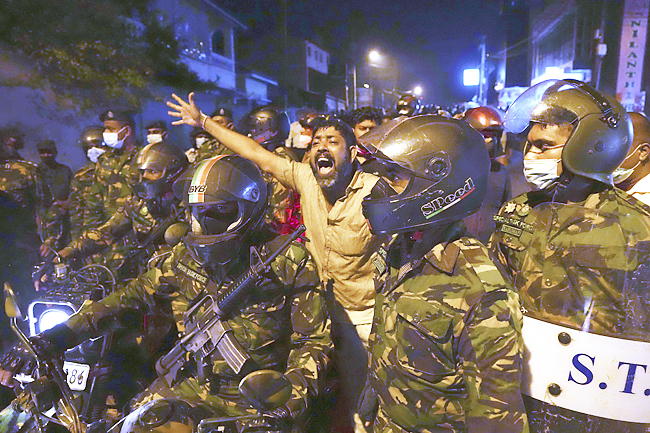COLOMBO, SRI LANKA (AP) – Dozens of people were arrested in Sri Lanka following protests near the president’s home demanding that he resign amid the country’s worst economic crisis in memory, police said yesterday.
President Gotabaya Rajapaksa’s office blamed “organised extremists” within the group of protesters for violence during Thursday night’s demonstration, where police fired tear gas and a water cannon at thousands of protesters and arrested 54 people.
An attorney representing some of the suspects Nuwan Bopage said several of them were being taken for medical examinations for various injuries and would likely appear in court.
The protesters blame Rajapaksa for long power outages and shortages of essentials. A police curfew that had been implemented in the suburbs of the capital was lifted yesterday morning.
On Thursday, the crowds demonstrating along the roads leading to Rajapaksa’s private residence on the outskirts of Colombo stoned two army buses that police were using to block the protesters from entering the road leading to the president’s house. They set fire to one of the buses and turned back a fire truck that rushed to douse it.
At least one person was severely injured in the leg when police fired tear gas cannisters directly at protesters to stop their attack on the bus. Several burned vehicles could be seen at the scene yesterday.

Sri Lanka has huge debt obligations and dwindling foreign reserves, and its struggle to pay for imports has caused the shortages.
People wait in long lines for fuel, and power is cut for several hours daily because there’s not enough fuel to operate generating plants and dry weather has sapped hydropower capacity.
Sri Lanka’s economic woes are blamed on successive governments not diversifying exports and relying on traditional cash sources like tea, garments and tourism, and on a culture of consuming imported goods.
The COVID-19 pandemic dealt a heavy blow to Sri Lanka’s economy, with the government estimating a loss of USD14 billion in the last two years.
Sri Lanka also has immense foreign debt after borrowing heavily on projects that don’t earn money. Its foreign debt repayment obligations are around USD7 billion for this year alone.



















































